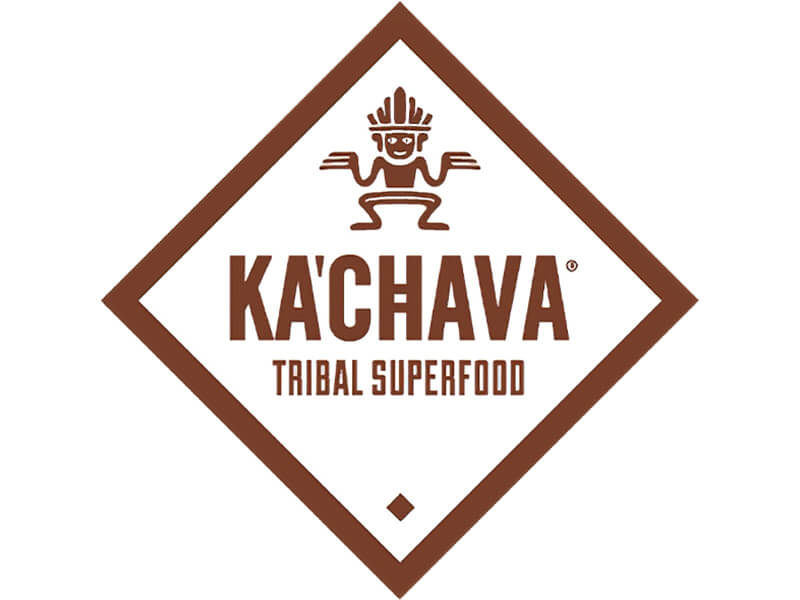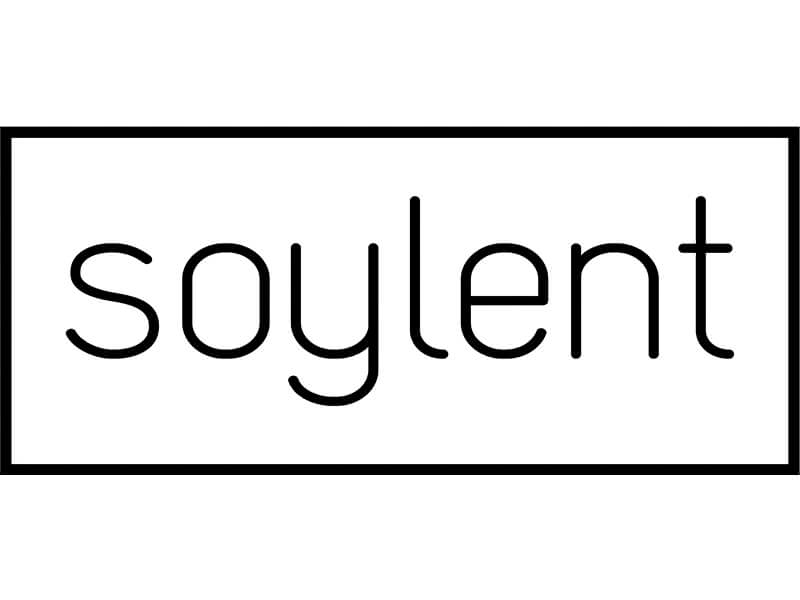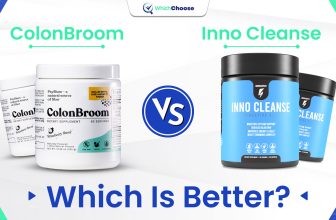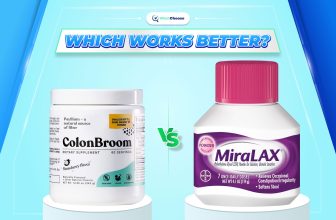Table of Contents
This post contains affiliate links. We earn an affiliate commission when you click our links to purchase products. It has no added cost to you.
WhichChoose will evaluate the nutritional supplements KaChava vs Soylent in this article. Thus, if you are seeking an IN-DEPTH evaluation of these two widely used supplements, you have found the proper place. Why? Because we’re going to find out in today’s post how KaChava stacks up against Soylent in terms of ingredients, protein content, taste, sugar, and more.
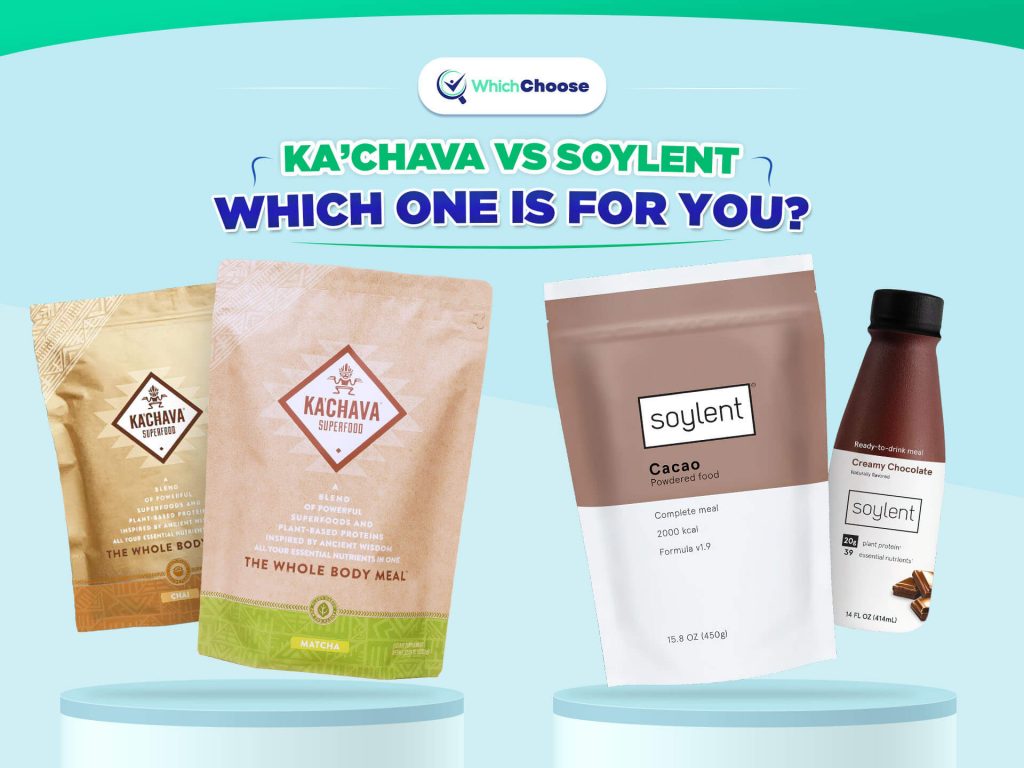
KaChava Vs Soylent: Overview
Strengthen muscles.
Improve your skin, nails, and hair.
Food-to-energy conversion.
Regulate metabolism to lose weight.
Boost mental health.
Create and protect immune cells [2] to prevent sickness.
Change flavors or amounts.
No hidden fees.
Cancel anytime, hassle-free.
$10 off each bag.
Convenient monthly delivery.
No commitment.
No surprises (pre-shipment reminders).
Strength & muscle health.
Improve heart health.
Immune system support.
Hydration.
Regulate metabolism.
Customize your subscription.
Exclusive subscriber savings.
1.1. KaChava
KaChava is a high protein, high fiber smoothie [3] powder. It is a plant-based, superfood “full body meal.”
Meal replacement smoothies are popular for folks who can’t eat a complete meal. This brand makes shake-like vanilla, matcha, chocolate, chai, and coconut acai. But they include superfoods that can promote health.
Dairy-free, gluten-free, and soy-free.
Vanilla flavor.
Replace a full meal.
Soy-free, dairy-free, and gluten-free.
Vegan.
Replace a full meal.
Vegan.
Match flavor.
Replace a full meal.
KaChava has no filler components like other meal replacements, so you’ll feel full for longer. Plus, they’re gluten-free and vegan.
1.2. Soylent
Soylent drinks provide healthier fats and protein than cafeteria drinks, making them better. Each 400-calorie drink contains fat, carbohydrates, protein, fiber, and micronutrients. The drinks come in liquid, powder, and cafe forms.
Soylent was created by software developers. They came up with the idea since they were frustrated by the time they had to spend cooking and typically opted for cheap junk food.
A rich, chocolatey taste.
Keep you full and focused.
Perfect for breakfast or lunch.
Keeps you full and focused throughout your day.
KaChava Vs Soylent: Nutrition And Ingredients
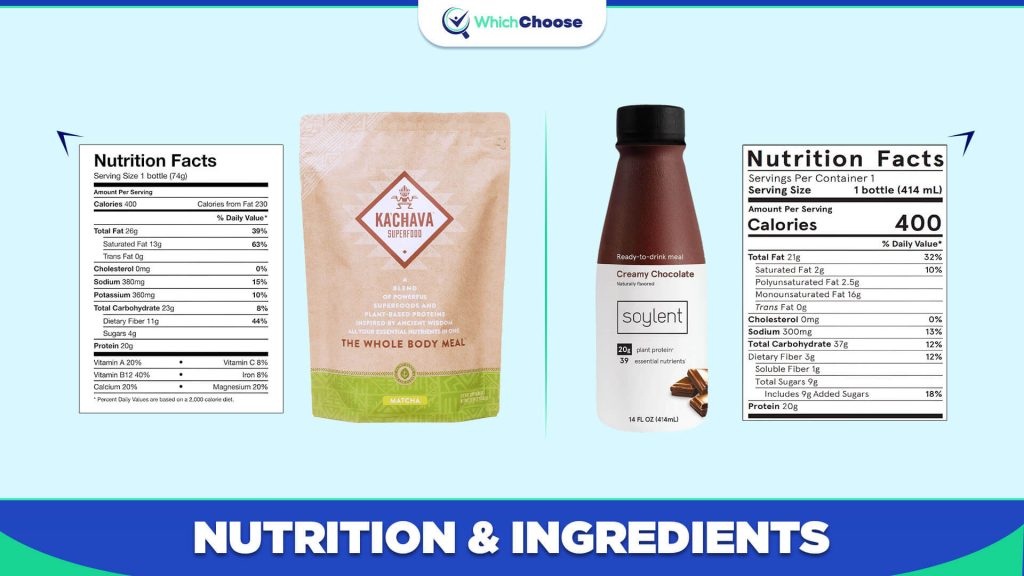
Regarding nutrition and ingredients, the table below will show you the differences between KaChava vs Soylent.
| KaChava | Soylent | |
| Ingredients | Grains, berries, vitamins, and macronutrients [4], and herbs. | Soy protein isolate, gellan gum, vitamin & mineral premix, canola oil, modified food starch, high oleic sunflower oil, oat fiber, sucralose, salt, natural and artificial flavors, and soy lecithin. |
| Flavors | Vanilla, chocolate, coconut acai, chai, and matcha. | Soylent coffee, Soylent powder (original, strawberry, vanilla, cacao, and mint chocolate). |
| Protein content | 27g/serving | 20g/serving |
| Sugar content | 8-9g/serving | 15g/serving |
Soylent Vs. KaChava: Pros And Cons
There is a money-back guarantee included.
It tastes like a sweet treat.
Vegan, soy-free, and gluten-free.
Subscription plans are available to help you save money.
The flavor could be too strong for your tastes.
The price is slightly pricey.
Available in powder and ready-to-drink forms.
It is widely available at major retailers.
The price is affordable.
Could cause emotions of lack concerning solid food/meals.
Soy, a common allergy, is present.
The ingredients have been heavily processed.
Artificial sweetener [5] is present.
Returns are not accepted through the brand’s website.
KaChava Vs Soylent: Price
4.1. KaChava
Customers can purchase KaChava shakes singly or as part of a subscription. Subscriptions can be set up for 15-, 30-, 45-, or 60-day periods and offer a discount of $10 for each bag.
If you have a subscription, you can pause it, delay it, or alter the frequency at which it is sent. Customers who are not subscribers are not permitted to buy a shaker bottle.
For a detailed price list, see below:
- 1 bag (15 meals): $70 in total ($4.66 per meal).
- 1 bag (15 meals) with the subscription: $60 in total ($3.99 per meal).
Replace a full meal.
Soy-free, dairy-free, and gluten-free.
4.2. Soylent
A 2.3-pound tub, providing 12 servings at two scoops each, can be purchased for $32 to $38. The price per serving works out to about $2.80.
If you want to save money on Soylent, you may subscribe to get it delivered to your door every month, or you can buy it in pouches for around $1.75 a pop. One caveat is that a minimum order of 7 pouches (35 meals) is required.
Soylent Vs KaChava: Side Effects

5.1. KaChava
Some people experience cramps, nausea, bloating, gas, and diarrhea from KaChava. These negative effects may be connected to how well certain people tolerate increased fiber [6]. Furthermore, some report allergy-related adverse effects as well.
5.2. Soylent
Soylent is generally safe, with few adverse effects. However, some Soylent users report gas and bloating.
Soylent contains soy, a common food allergen; thus, anyone with soy allergies shouldn’t consume it. Moreover, caffeine-sensitive people may experience negative effects from some Soylent products.
Again, WhichChoose wants to reclaim that KaChava is the winner in the battle of KaChava vs Soylent. When choosing a champion, we would include the following factors: a variety of ingredients, the cost of each supplement, and muscle development. Although KaChava is more expensive than Soylent, it’s worth buying and trying. We promise that it is worth every penny!
Sources:
- [1] Shreiner, Andrew B.; Kao, John Y.; Young, Vincent B. (2015). The gut microbiome in health and in disease. Current Opinion in Gastroenterology, 31(1), 69–75. doi:10.1097/MOG.0000000000000139.
- [2] Immune System Research. National Institute of Allergy and Infectious Diseases. Available at https://www.niaid.nih.gov/research/immune-system-research.
- [3] Mehta, Dipakkumar; Kumar, M. H. Sathish; Sabikhi, Latha (2017). Development of high protein, high fiber smoothie as a grab-and-go breakfast option using response surface methodology. Journal of Food Science and Technology, (), –. doi:10.1007/s13197-017-2841-z.
- [4] Carreiro, Alicia L.; Dhillon, Jaapna; Gordon, Susannah; Higgins, Kelly A.; Jacobs, Ashley G.; McArthur, Breanna M.; Redan, Benjamin W.; Rivera, Rebecca L.; Schmidt, Leigh R.; Mattes, Richard D. (2016). The Macronutrients, Appetite, and Energy Intake. Annual Review of Nutrition, 36(1), 73–103. doi:10.1146/annurev-nutr-121415-112624.
- [5] Tandel, KirtidaR (2011). Sugar substitutes: Health controversy over perceived benefits. Journal of Pharmacology and Pharmacotherapeutics, 2(4), 236–. doi:10.4103/0976-500x.85936.
- [6] Lattimer, James M.; Haub, Mark D. (2010). Effects of Dietary Fiber and Its Components on Metabolic Health. Nutrients, 2(12), 1266–1289. doi:10.3390/nu2121266.
WhichChoose is the website products and services review that helps users in the world to find what the best is and shop easily.


